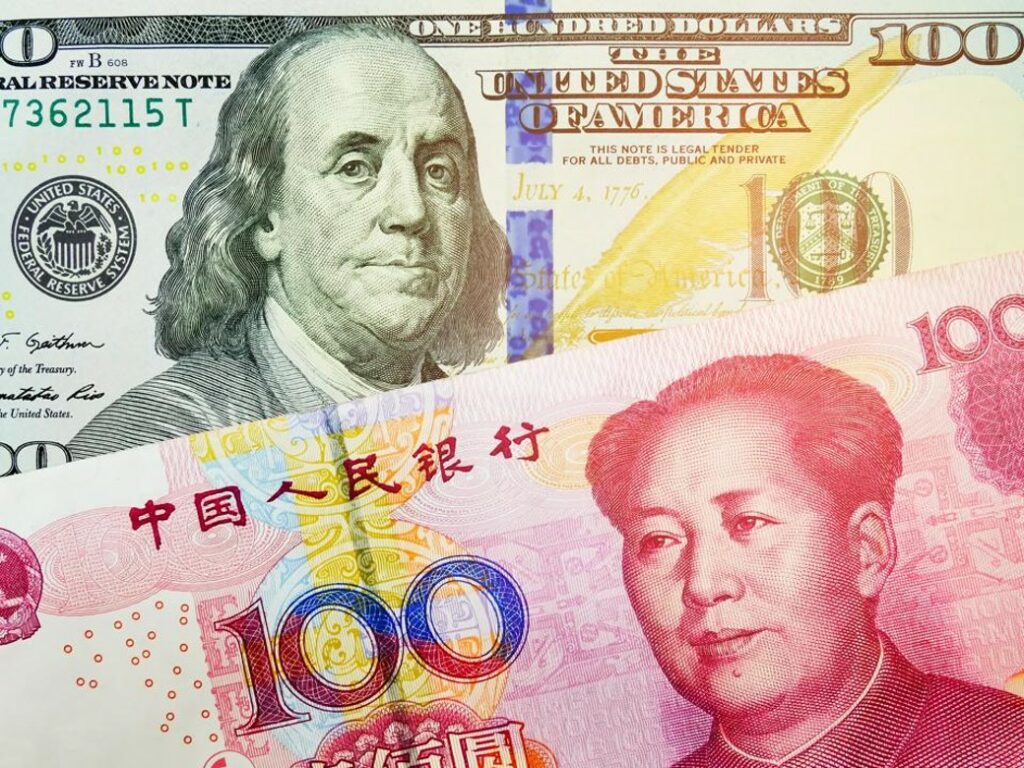The global financial landscape is on the brink of a monumental shift, with JPMorgan throwing a spotlight on the Chinese Yuan’s potential to unseat the US Dollar from its long-held throne. This prediction isn’t just a casual remark in the world of currencies; it’s akin to forecasting a tectonic shift in the very bedrock of international trade and economics.
BRICS Bloc’s Push for De-dollarization
At the heart of this potential upheaval is the BRICS bloc, a coalition of emerging economies, which has been steadily chipping away at the dollar’s dominance. Their strategy? A concerted push towards de-dollarization, favoring local currencies over the ubiquitous greenback. This isn’t a subtle nudge but a bold, calculated move to redefine the rules of global finance.
The Chinese Yuan, in this grand scheme, is emerging as the poster child of this movement. It’s not just about being an alternative; it’s about being a frontrunner in a race that many didn’t even realize was on. And the statistics speak louder than words – there’s an evident spike in the Yuan’s use within the BRICS transactions, painting a clear picture of a currency on the rise.
Strategic Shifts Paving the Way for the Yuan
Enter Alexander Wise of JPMorgan, a strategist whose insights have the weight to sway opinions in financial circles. He isn’t just talking about China’s growth; he’s linking it directly to the Renminbi’s (Yuan) future as a heavyweight in the global economic arena. His views aren’t just forecasts; they’re a roadmap for how the Yuan could climb to the top.
Wise talks about a slew of strategic moves – from relaxing capital controls to boosting market liquidity – that could bolster the Yuan’s position. It’s not just about playing the game; it’s about changing it. China’s maneuvers to position its government bonds as a secure asset are also part of this master plan. It’s like watching a chess game where China is thinking several moves ahead.
The Dollar’s Uncertain Horizon
The US Dollar’s fate, in this narrative, is like a star whose light is dimming. As the Yuan’s luminescence grows, the Dollar’s glow wanes. It’s not an overnight change, but a gradual, inexorable shift. The dollar has been the bedrock of international trade for so long that imagining a world where it’s not the mainstay is both intriguing and unsettling.
And it’s not just about economics. This shift speaks volumes about geopolitical dynamics, signaling a change in how nations perceive and use currencies in the grand chessboard of global politics. The Yuan’s rise and the Dollar’s potential fall are not mere fluctuations in currency values; they are harbingers of a new era in international relations.
In essence, JPMorgan’s prediction is more than a financial forecast; it’s a narrative of change, a story of emerging powers and shifting balances. The Yuan’s ascent to potentially dethrone the Dollar is a saga that will be keenly watched and analyzed in the annals of economic history. As the world watches this unfold, one thing is clear: the currency wars are not just about money; they’re about influence, power, and the future shape of global order. The battle lines are drawn, and the world is poised to witness a financial revolution, with the Yuan leading the charge.





